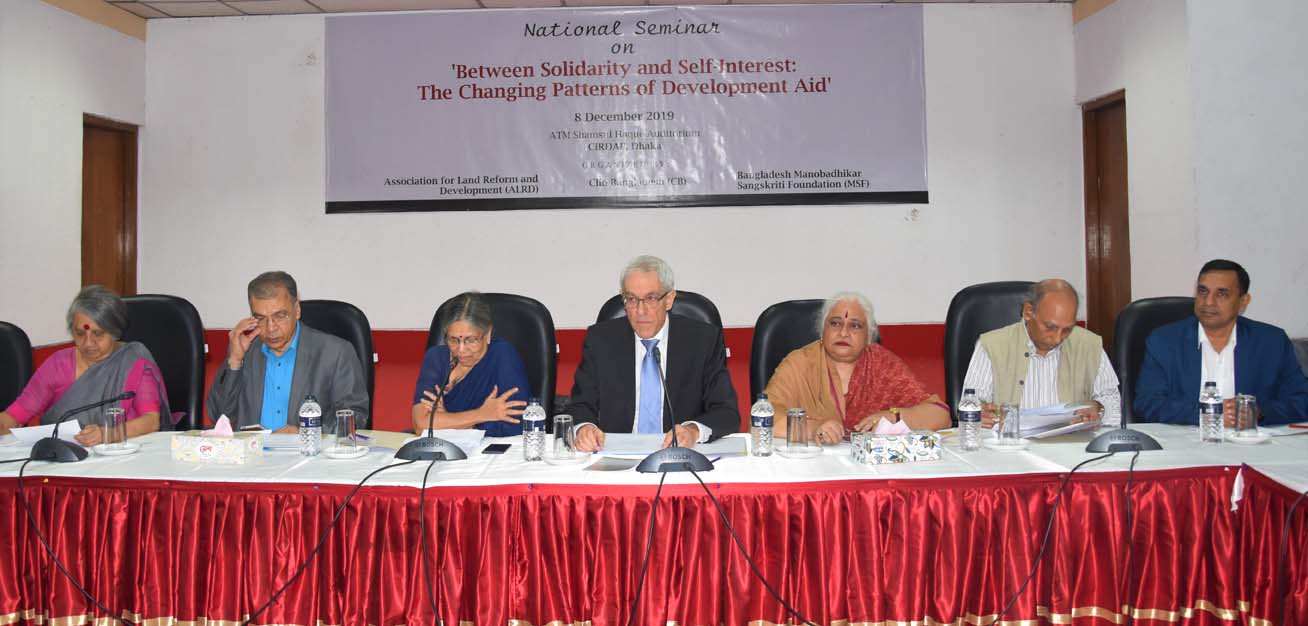Seminar on Between Solidarity and Self-Interest: The Changing Patterns of Development Aid
[Background: Historically, the conception and extension of development aid has not merely favored national and corporate interests. Rather, as various discussants explained, it has operated through entrenching and exacerbating inequality – nearly always at the direct expense of so-called “beneficiaries” in countries receiving aid – such that private sector actors could selectively reap the benefits of new infrastructure, favorable legislation, and budding industries. Donor countries and their political elites, as well as the international financial institutions, likewise exploited the development aid complex to bolster their reputations as champions of poverty reduction, empowerment, and “modernization.”]
On 8 December 2019, human rights advocates convened in at the CIRDAP centre in Dhaka to discuss how the development aid complex serves donor interests at the expense of the well-being of the most oppressed social groups of recipient countries. The seminar was chaired by Advocate Sultana Kamal, President, MSF and TIB, and was organized by Association for Land Reform and Development (ALRD), Bangladesh Manobadhikar Sangskriti Foundation (MSF), and Clio Bangladesh (CB).
His Excellency Dr. Rene Holenstein, Ambassador of Switzerland in Bangladesh and Keynote Speaker of the seminar, delineated the various paradigms which have characterized international development since its origins in the 1940s. Under the guise of “development” and “assistance,” Northern donor countries attempted to conceal their political and economic agendas, instrumentalising aid as a means to prevent the spread of communism and to create favorable conditions across the Global South for their corporations and investors.
Two of the seminar’s Distinguished Discussants – Mr. Walter Mwasaa, Chief of Party of SHOUHARDO-II Programme, CARE Bangladesh; and Ms. Khushi Kabir, Coordinator of Nijera Jori and Chairperson of ALRD – described subsequent changes in development aid in accordance with the rise of neoliberalism. As donor countries deployed structural adjustment in the 1980-90s as a rigid, one-size-fits-all model, they lacked any recognition of specific differences across national contexts; this model also aimed at stimulating GDP growth and foreign investment at all costs, thereby escalating income and wealth inequality. Mr. Ahmedur Rahaman, CARE Bangladesh, also cautioned that we must critically assess the quality of aid to ensure that it does not reproduce its historically deleterious impacts, as development assistance in the structural adjustment era undermined the rural economy and fueled internal displacement.
Distinguished Discussant Dr. Iftekharuzzaman, Executive Director of Transparency International Bangladesh (TIB), characterised the current donor-recipient relationship as situated somewhere “between self-interest and solidarity.” He explained that donor countries provide aid neither as compensation for their historical role in undermining substantive Southern development, nor as solidarity with oppressed social groups whose rights must be ensured for subsistence and access to necessary goods and services. Instead, development aid largely functions as an extension of foreign policy and as a vehicle through which corporations can expand and investors can profit.
Social justice, accountability, and inclusivity – as enshrined in the SDGs – will not be much more than rhetoric if development aid does not solely benefit the most vulnerable groups in society, remarked Mr. Shamsul Huda, Executive Director of ALRD. As emphasised by discussants, development in Bangladesh must ensure land rights, climate change mitigation, and labor rights for agricultural workers – especially for women. To paraphrase Ms. Rowshan Jahan Moni, Deputy Executive Director of ALRD, attaining inclusivity and sustainability necessitates that we champion women’s land and labor rights as paramount. Furthermore, Mr. Zayed Iqbal Khan, General Secretary of Bangladesh Krishok Federation, stressed the necessity of advocating land reform, as the exclusion of family farmers will impede development altogether. Ms. Aroma Dutta, MP and Adviser of Prip Trust, added that although the most recent development paradigm endorses participatory governance, it must address the diminishing space for civil society actors in policy decision-making and implementation.
As underscored by Mr. Shamsul Huda, development must entail substantive changes in the lives of historically oppressed peoples and thus must center on human rights, land rights, and ecological preservation. In the same vein, Advocate Sultana Kamal elucidated that “development” should not reflect top-down paradigms of the past – relief, technological transfer, or empowerment – but must be equated instead with liberation.
News link:
1. http://www.newagebd.net/article/93101/development-projects-pursue-donors-interests-experts
2. https://www.thedailystar.net/city/news/foreign-aid-must-be-driven-dev-demands-speakers-1837870





